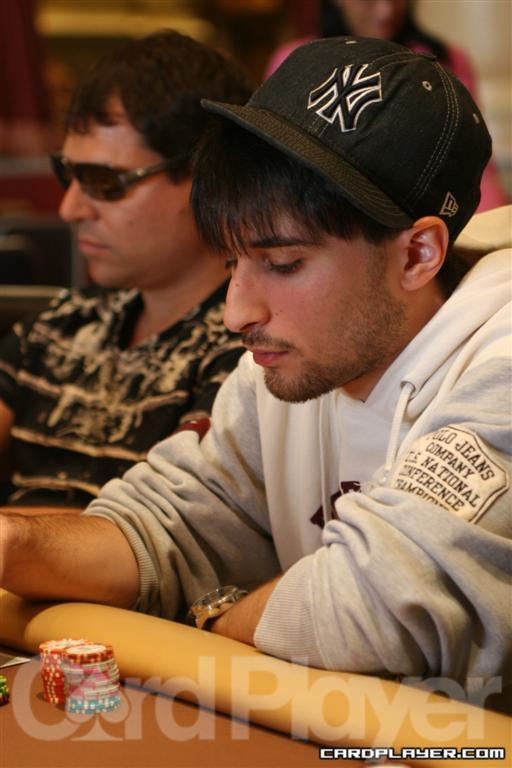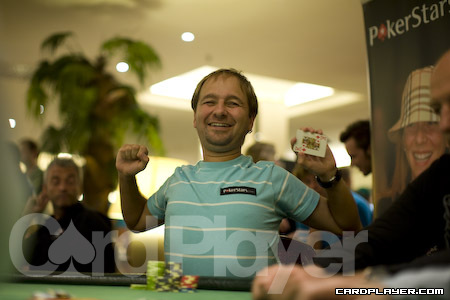






The Art of the Chop -- Poker NegotiationsTwo Pros Disagree on Deal-Making |
|
|

Imagine you’re a casual player with a couple hundred dollars in your poker account. You decide to play a bigger tournament than you’re accustomed to, but it works out in a big way. After having the tournament of your life, you’re sitting at the final table. With outrageous pay jumps for every place and blinds feeling more ferocious by the minute, the table starts discussing a deal. You’re already playing for more money than you’ve ever played for before. What should you do?
Well, that depends on whom you ask.
Daniel Negreanu, Card Player’s 2004 Player of the Year, recommends that you avoid making deals for a variety of reasons. Alex “AJKHoosier1” Kamberis, on pace to become Card Player’s 2008 Online Player of the Year, says it’s OK to consider it if you think you don’t have an edge, but argues that you shouldn’t be complacent with what you’re scheduled to get.
A chop at the final table is when the remaining players decide to split up the prize pool in a way that is different than the tournament is scheduled to pay out. With huge differences in pay for different places, it is not rare to see the final few competitors of a tournament work out a deal.
Take a look at a recent $10 rebuy tournament on PokerStars. More than 2,000 people participated, with nine making the final table. First place paid $13,216, while ninth place only paid $902. Both players had outlasted more than 2,000 players, yet one received more than 14 times what the other player got.
Although you don’t see many chops on TV, final-table deal-making has always been a variable at poker tournaments, both live and online.
 Negreanu decided a long time ago to accept a “no chop” policy, and he advises other players to consider it. In a 2001 article for Card Player, which he says he still believes entirely today, he wrote, “By not making a deal, I would never be getting the worst of a deal, and I wouldn’t be hustling or swindling anybody into a bad deal.”
Negreanu decided a long time ago to accept a “no chop” policy, and he advises other players to consider it. In a 2001 article for Card Player, which he says he still believes entirely today, he wrote, “By not making a deal, I would never be getting the worst of a deal, and I wouldn’t be hustling or swindling anybody into a bad deal.”
Kamberis, who recently negotiated one of the biggest chops in online poker history at the 2008 World Championship of Online Poker (WCOOP) main event, couldn’t disagree more about the “hustling and swindling” attitude.
“Chopping is absolutely part of the game,” said Kamberis. “Just like when you’re at a table and you read the players, you read the players during a chop — seeing which players aren’t really going to fight over it and who’s complacent with the money they’ve already made.”
He says that final table moments are not the time to be generous. He suggests taking what sounds to be an almost Machiavellian approach.
“Don’t be afraid to be pretty ruthless. Go after what you can possibly get,” said Kamberis. “You try to get a feel for who you can take advantage of. It sounds bad ... but I think it’s just like when you’re sitting at a table, you’re just trying to get more money. That’s what you’re doing the whole time; why should the chop be any different?”
In the 2008 WCOOP main event, when it got down to five-handed play, players asked PokerStars to crunch the numbers to see what a by-the-chips chop would look like. PokerStars will accept any deal that all players agree on (as long as a certain amount of money is held aside for the ultimate winner in marquee events), but players usually ask them to show chop numbers according to chip counts.
The fairness of this method has been debated extensively through online poker forums. Many people argue that this method favors the big stack and hurts the small stack, and believe a better method to be the Independent Chip Model, or ICM, which calculates your equity as opposed to just your stack.
When the players at the WCOOP were given their chip count chop numbers by a PokerStars representative, Kamberis was originally slotted to get $672,542. By the time he finished talking, he guaranteed himself at least $782,542. An additional $110,000, thanks to a few minutes of negotiations. How did he do it?
“Immediately when I saw the (original) numbers, I said, ‘That’s not going to work for me,’” said Kamberis. “Honestly, I hadn’t even really looked at the numbers. I just knew that whatever came up, I was going to try to get more. It’s common sense.”
Kamberis said that players are way too content just taking whatever money is offered, or even giving up some of their own prize money. A quick Google search of “worst poker chops” will show a number of deals in which intimidated players, eager to take a guarantee of added cash, gave up all of their negotiating power at the table. Kamberis understands that by chopping, people will already win a large sum of money, but that doesn’t mean that they should forget how much money is still at stake during the discussion.
Negreanu admits that he doesn’t feel comfortable in persuading players to take what would be a bad deal for them, but that isn’t the only reason for his “no chop” policy.
Back when there weren’t thousands of players per tournament, final tables often contained a number of his friends. And as any pro will tell you, you shouldn’t really chop if you are confident that you are better than your opponents (with perhaps an exception being that the prize money is life-changing). Negreanu never wanted to get into a sticky situation where he’d chop with someone (because he respected their abilities), and not chop with another player (because he was confident he could beat him). He affectionately refers to it as “poker politics.”
So, what should you do when approached with a chop proposal? You’ll have to decide for yourself if chopping is for you, but if you’re worried about getting the short end of the stick, there are a few things to keep in mind.
Most poker professionals, Kamberis included, generally do not like to chop, because most of the time they are the best players at the table and are confident that they will be able to take it down. But if you are playing for a life-changing amount of money, or if you don’t believe you have an edge, you might want to consider making a deal.
